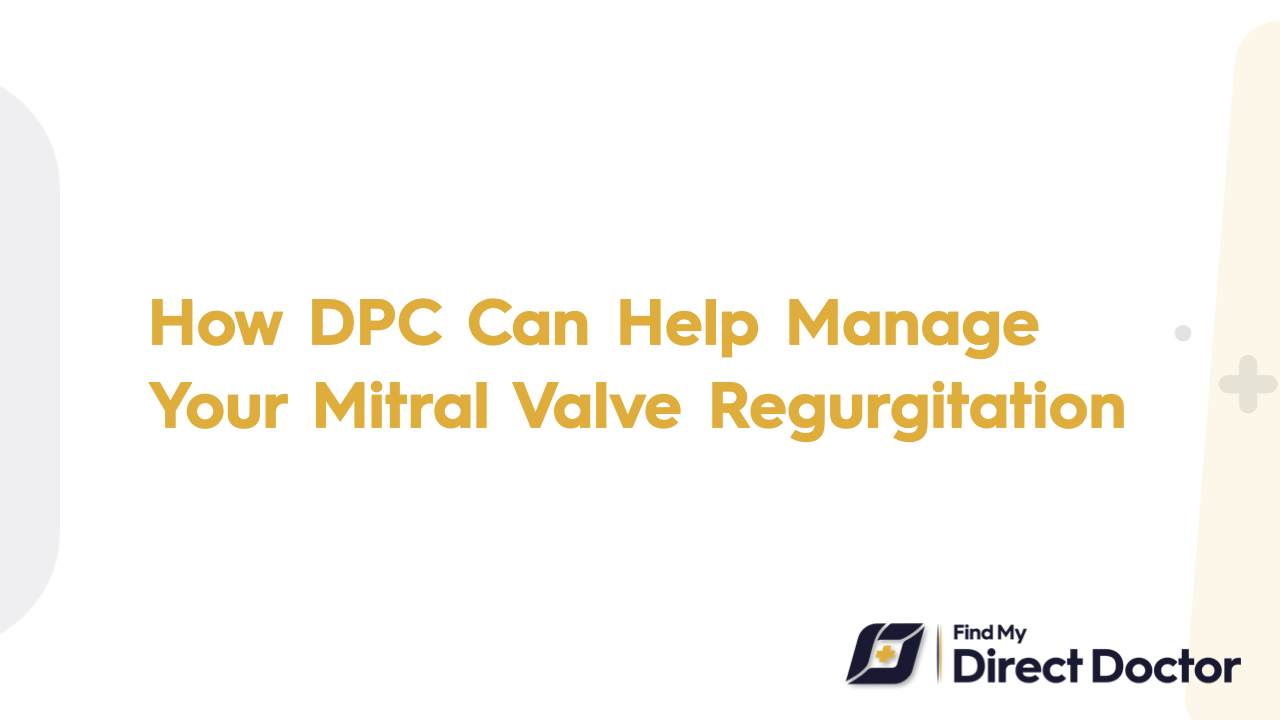



A cardiac ailment known as mitral valve regurgitation (MVR) occurs when the mitral valve, which separates the left atrium from the left ventricle, malfunctions and permits blood to return to the left atrium during heartbeats. Known as "leakage," this backward flow can make the heart work harder to pump blood, which over time may weaken the heart muscle. Mild to severe mitral valve regurgitation can occur, and if treatment is not received, it can occasionally result in consequences such cardiac failure or arrhythmias.

Depending on how severe the illness is, MVR symptoms might vary. Breathlessness, exhaustion, palpitations, leg or abdominal edema, and a heart murmur are typical symptoms. As the illness worsens, people could find it harder to move around or feel as though their chest is constricted. In more extreme situations, MVR may result in serious cardiac issues that call for immediate medical care.
By emphasizing personalized, ongoing care, Direct Primary Care (DPC) offers a useful approach for treating mitral valve regurgitation. Patients in a DPC model have direct contact to their primary care physician, which facilitates prompt evaluations and the early identification of symptoms or conditional changes. Regular monitoring allows a DPC physician to monitor the course of MVR and, if required, coordinate specialized treatment with a cardiologist.
Additionally, DPC providers are uniquely positioned to treat MVR symptoms. DPC can help lessen the strain on the heart and ease some of the symptoms related to regurgitation by addressing lifestyle factors like diet, exercise, and stress management. Additionally, medications may be administered to lower blood pressure, lessen the risk of arrhythmias, and help regulate the strain of the heart. People with MVR are guaranteed to get the care and support they require to effectively manage their illness thanks to this individualized and preventative care.
The more individualized approach to treatment is one of the main advantages of DPC for individuals with mitral valve regurgitation. Patients may only see their primary care physician for short sessions with lengthy intervals between appointments under a typical healthcare practice. DPC, on the other hand, provides longer appointment times and more accessibility, guaranteeing that patients with MVR can talk about their symptoms, available treatments, and any worries they may have. By preventing difficulties and enabling early interventions, this constant care can enhance long-term results.
Additionally, DPC gives patients the tools they need to actively manage their heart health. Continuous monitoring enables DPC physicians to promptly detect any deterioration in symptoms or emergence of new health problems, facilitating necessary treatment modifications. Furthermore, DPC's focus on establishing a lasting relationship with a healthcare practitioner promotes trust and motivates patients to follow their treatment regimens. DPC's supporting character gives those who are managing chronic diseases like mitral valve regurgitation peace of mind.
The purpose of Direct Primary Care's personalized therapy of mitral valve regurgitation is to adjust care to meet the specific requirements, preferences, and health objectives of each patient. Healthcare professionals can collaborate closely with patients using DPC to create a care plan that takes into account their unique symptoms and situation. This could entail modifying prescriptions, providing advice on stress management, and suggesting heart-healthy eating and exercise regimens that lessen the strain on the heart.
Furthermore, DPC enables more frequent check-ins, guaranteeing continuous, focused care for individuals with mitral valve regurgitation. The care plan can be modified as necessary because of the early detection of any changes in the condition made possible by this careful monitoring. DPC ensures that patients with MVR have the tools and support they need to properly manage their heart health by offering a tailored strategy that enhances their overall quality of life.
Previous Post